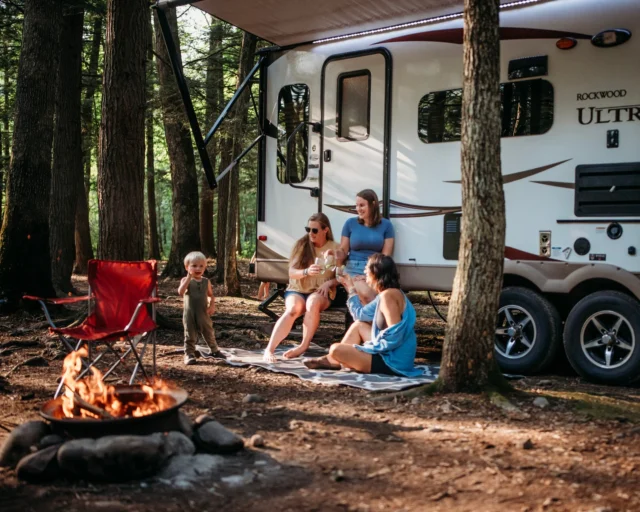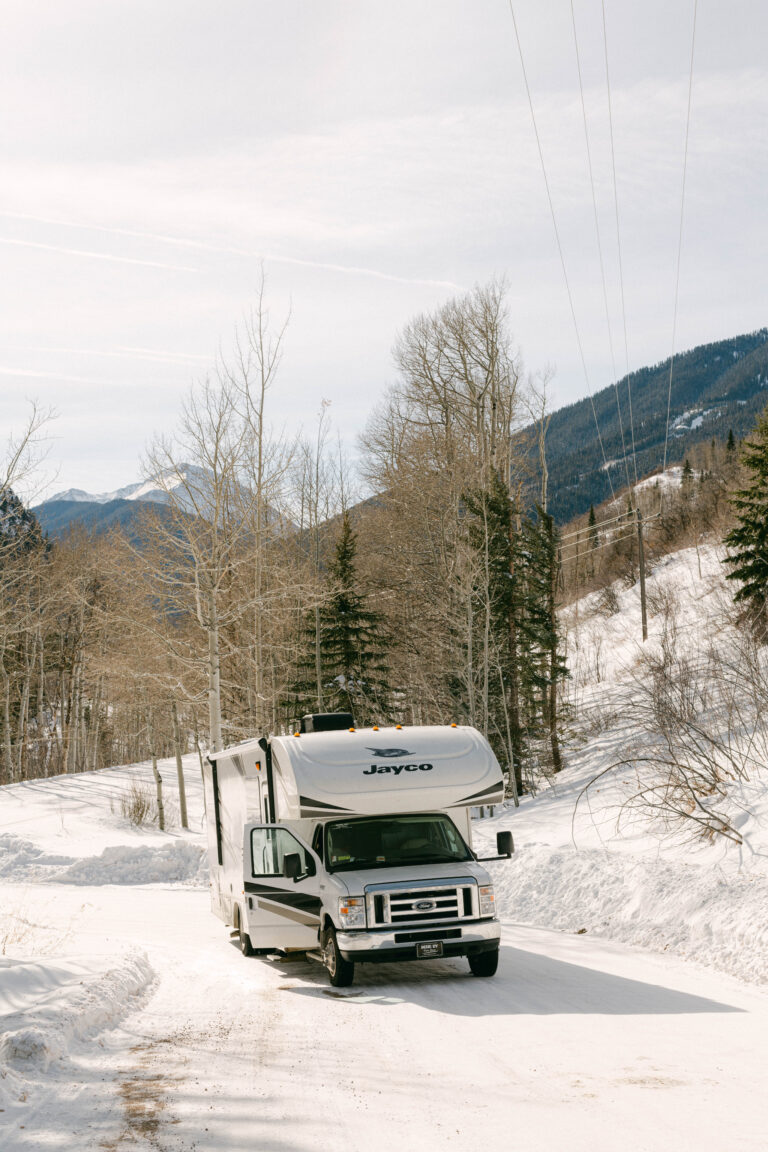
There is a certain set of people who want an RV that can be lived in during all seasons. They want their home on wheels to be comfortable in the heat of summer, the cold of winter, and everything in between. The truth is that most RVs are not built for this kind of use. But that doesn’t mean they aren’t out there. If you want to travel this way, you are going to need a “Four-Season RV.”
If you do an online search for the term “Four-Season RV”, the result will be a lot of truck campers and motorhomes or trailers that can withstand high levels of heat and cold. Beware! Not all of them are what the manufacturer implies. Sometimes the only difference between a normal RV and a “Four-Season RV” is the weight surplus and the high price.
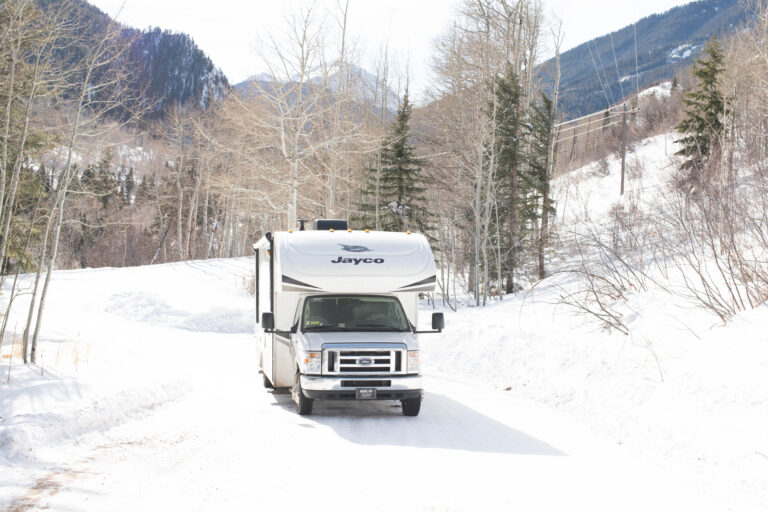
What is a Four-Season RV?
You won’t find any industry-wide criteria in regard to materials or design that designate an RV as four-season worthy. In this article, you will learn about the exact characteristics needed in an all-weather RV. With this information, you can purchase the perfect RV, or even weatherize your existing RV for any type of weather.
How Will You Use Your Four-Season RV?
Consider where you want to take your RV and how you will use it. The answer to these questions will determine the environmental stress your RV needs to withstand. This is essential knowledge if you want to purchase or improve a motorhome that can last you a lifetime, in any season, or on any type of terrain. Ask yourself the following questions:
- Will you take your RV on short or long trips?
- Will you travel alone?
- Will you choose hook-ups or dry camping?
- Is your RV ready for off-road and remote, rugged areas?
- Will you turn your RV into a permanent living space?
These questions will help you determine the specific features you need in a four-season RV such as the amount of space, solar panels, extra heating or cooling, etc. Now you are ready to go shopping.
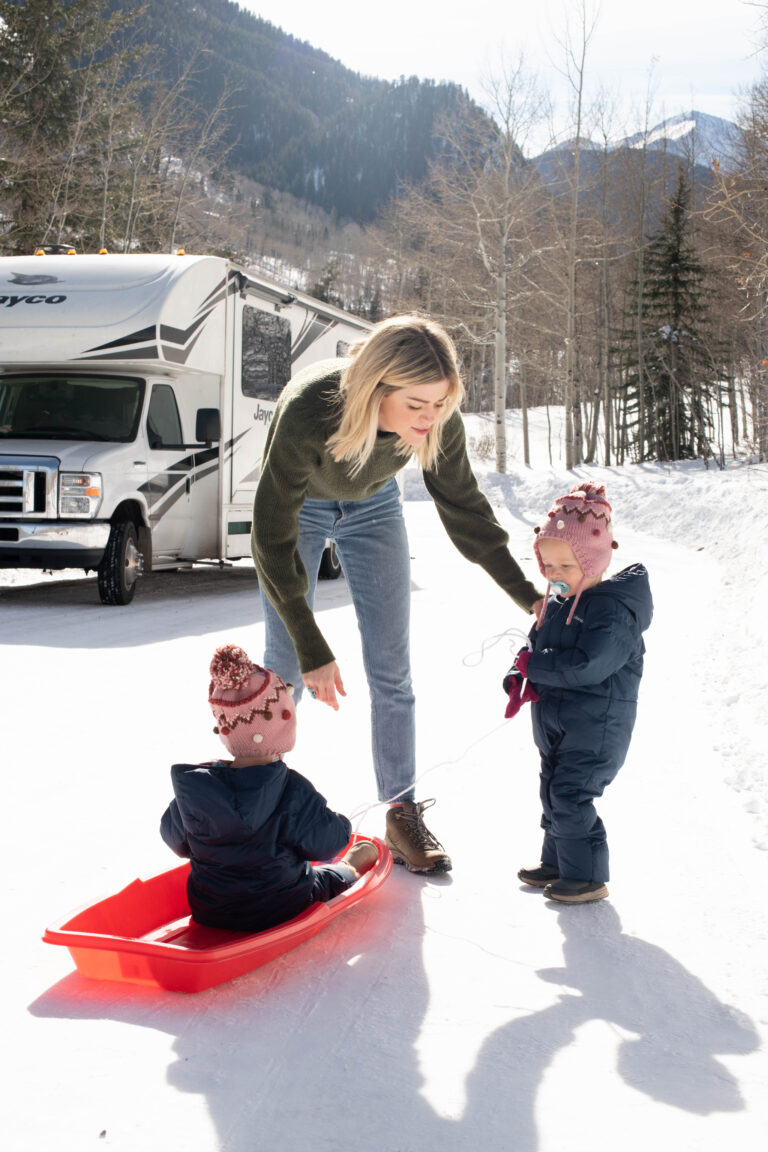
A Great Source of Information: RV Consumer Group Reports
Once you know the desired living conditions and features needed, it’s time to find a four-season RV at an affordable price. A great place to start is with the RV Consumer Group. These experts on this website are trained and informed about the quality materials that make a great motorhome. You will learn about the overall durability and comfort of a rig as it is tested at both severe hot and cold temperatures. They also have these informational books and guides to help with your purchasing process.
There are four important factors to consider when purchasing a four-season RV or improving an existing RV to be four-season ready.
- Insulation
- Wall Structure
- Window Size
- Venting and The Heating & Cooling Systems
RV Consumer groups have a set of ratings, that helps lead you down the right path when it comes to choosing the perfect RV for all conditions. These ratings will tell you if your RV is fit for:
- Weekend Use (WE): If you plan on a stay short during temperatures of 40-80 degrees Fahrenheit.
- Vacationing Use (VA): If you plan to spend more than two months in an RV with temperatures of 30-90 degrees Fahrenheit.
- RT: RV trekking (RT): If you love off-road RVing and want to experience the wilderness thoroughly. All the occupants of this RV should stay comfortable during freezing temperatures or extreme heat waves.
- Snowbird RVing (SB): If you plan to spend more than 6 months in temperatures varying from 30 to 90 degrees Fahrenheit.
- Fulltiming (FT): If you plan to live full-time in your RV. The RV has to withstand all types of temperatures and has to perform exceptionally off-road.
What Construction Materials Make a Great Four-Season RV?
Construction materials play an important role in determining the all-weather capability of an RV. All manufacturers have their own material choice, and most list the material on their websites. Check them all and contact them to see what packages they might offer you. Remember, you are looking for high-quality construction materials.
Four Season RVs have better sidewalls & roofs, ceiling insulation, and enclosed and insulated holding tanks. You should choose the manufacturer carefully. The better their RV reviews, the better the four-season RV will be fabricated for your needs.
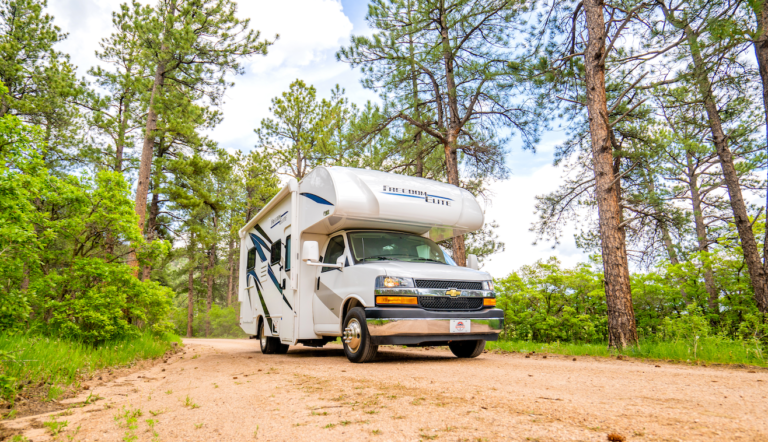
A quality-built four-season RV should have:
- A nice living area where occupants can experience a comfortable stay during temperatures lower than 20 degrees and higher than 90.
- Sufficient insulation to prevent holding tanks and valves from freezing at any temperature.
- Air circulation that keeps the RV cool at any heat and reduces condensation.
- Insulation to keep unwanted air from entering the RV through windows, walls or cabinets.
It can be hard to find all that in one RV, although a lot of manufacturers claim that they can provide a four-season RV. It’s important to determine for yourself if the RV is qualified.
- Do a side-by-side inspection of the materials used in the manufacturing process.
- Visit online forums and talk to users that are familiar with four seasons RVs.
- Inspect the unit for unwanted weather damage such as mildew, water spots, or rot.
- OR, you could just buy one and live in it for a while.
A Few Ideas for modifying an RV for All-Weather Camping
There’s a high probability that the RV your searching for/owning is a bit unqualified for extreme weather. In this case, you can modify the RV for all-weather conditions. Here are some ideas:
- Add self-adhesive insulation to your windows.
- Add new weather stripping around the entry door.
- Use foam to cover vents or spaces that let cold air slip inside the RV.
- Apply foil-backed insulation sheets to line your windows.
- Don’t worry about freezing and buy a tank heater.
- Cover water lines and dump valves with heat tape.
- Add antifreeze inside your holding tanks when not in use.
- Purchase a dehumidifier to rid the air of excess condensation.
- Try a hydronic heating system.
The Best Extreme-Cold-Weather RVs
Not sure where to begin your search for the perfect cold-weather RV? Here are our recommendations. We’ve provided one for each RV type, so no matter what kind of RV you prefer, you’ll be able to stay nice and toasty during your winter camping adventures.
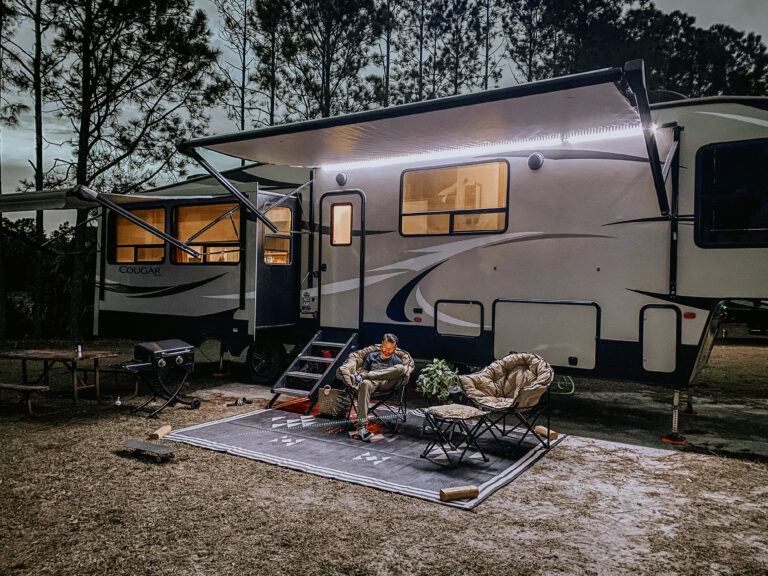
Northwood Arctic Fox Travel Trailers
Our favorite bumper-pull travel trailers for extreme cold weather camping are the Northwood Arctic Fox Travel Trailers. The brand that makes these trailers is based in the mountains of Oregon, meaning the folks who design them know cold weather and how to deal with it.
To keep campers warm, foam insulation is used in the walls and ceilings. Additionally, reflective foil insulation is used on the roof and slide out, an extra measure that can really increase comfort levels inside the RV.
When it comes to protecting the water system, Arctic Fox trailers are on the ball. These RVs include insulated water lines, enclosed dump valves, and insulated and suspended holding tanks.
Keystone Montana Fifth Wheels
Prefer a fifth wheel over a bumper-pull? If so, you should look into Keystone Montana Fifth Wheels. This is a very popular fifth-wheel model, especially in the full-time community. Why? Because it handles extreme weather well.
In fact, the manufacturer of Montana fifth wheels put their designs to the test by placing a Montana in a controlled test chamber where they lowered the temperature to a bone-chilling -4°F. Believe it or not, the temperatures in the interior of the RV remained in the 70s and the plumbing system continued to function normally without any freezing!
Clearly, this fifth wheel is made to withstand extreme cold, and we can heartily recommend such a well-made rig.
Jayco Redhawk Class Cs
Those who prefer a drivable RV but don’t want a huge class A will likely turn to the smaller class C option. Unfortunately, it isn’t exactly easy to find a winter-friendly class C camper. That said, they are out there, and the Jayco Redhawk is definitely our top pick.
This motorhome is surprisingly well insulated, especially in the roof where many RV manufacturers tend to skimp. Additionally, the RV comes standard with 12V holding tank heating pads, meaning your tanks will never freeze. On top of all this, the furnace on this rig is an awesome 31,000 BTU, meaning you should be able to keep warm even on the coldest nights.
Newmar Dutch Star Class As
Finally, there is the class A category of cold-weather RVs. When it comes to choosing an excellent class A for winter trips, we have to recommend the Newmar Dutch Star motorhome.
This luxury motorhome has a hydronic heating system that heats the coach in chilly weather and provides hot water on demand. Radiant floor heat keeps your feet nice and toasty even in the coldest weather, and this heat—combined with the built-in electric heating system—can keep you warm in most weather without using any fuel.
If you do go into extremely cold temperatures, you can use these two systems plus the diesel burner to keep things warm no matter how cold it gets.
Of course, it also helps that Newmar builds top-notch rigs, meaning the Dutch Star is a well-insulated motorhome. This ensures that the heat produced by these systems is kept in the rig, keeping you comfortable throughout the winter.
Tips and Tricks for Winter Camping
Even with the very best cold-weather RVs, there are still things you might want to do in order to ensure you stay warm and that your RV doesn’t sustain any damage.
Try these tips for winter RV camping:
Insulate Windows
Windows allow warm air to get out and cold air to get in. Prevent this by putting Reflectix in all windows during extreme weather.
Use Space Heaters
Space heaters can be used in conjunction with your propane furnace to keep things extra warm, or instead of the furnace to save fuel.
Install Tank Heating Pads
If you’re worried your tanks might freeze, consider installing tank heating pads. This is easy and inexpensive and might just save you a load of money.
Consider RV Skirting
RV skirting can also help keep your plumbing from freezing. Using a skirt along with a small space heater under the rig is even more effective.
Get Slide Toppers
Slide toppers can help hold heat in slide rooms where insulation tends to be poor. They can also help prevent slide leaks.
Invest in a Heated Hose
A heated hose will ensure the water coming into your rig continues to flow even in the coldest of temperatures.
Leave Tanks Closed
Leaving tank valves open can result in a frozen sewer hose and valves that won’t close. If you’re camping in below freezing temps, be sure you close the valves immediately after dumping the tanks.
Run a Dehumidifier
Camping in cold weather can result in a lot of moisture buildup in the RV. This can lead to damage. Combat this problem by running a dehumidifier as often as possible.
Use DampRid
DampRid can also help control excess moisture, especially in cabinets and other enclosed spaces where the dehumidifier may not do much good.
Are You Ready for a Four-Season RV?
There are countless possibilities when it comes to four-season RVs. Be sure to seek out the one that suits your own needs for climate and travel conditions. Remember that a typical RV is not built to withstand extreme conditions and look for quality materials, better heating and cooling options, and tight windows and doors. In the end, you might need to make some improvements yourself to get the four-season RV to suit all your needs.
Happy camping!






